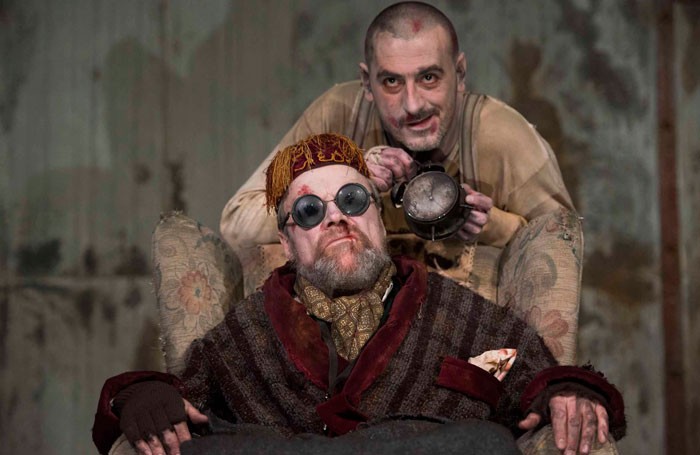@ Citizens Theatre, Glasgow, until Sat 20 Feb 2016
As Theodor Adorno eruditely noted, ‘understanding [Endgame] can mean nothing other than understanding its incomprehensibility, or concretely reconstructing its meaning structure – that it has none.’ This can be more succinctly explained by a fellow audience member, who, in a panto-loud whisper, declared her stance on the work of Beckett early on: ‘I just don’t understand what’s going on.’
She’s not wrong. This is an apocalyptic nightmare, where the two main protagonists, Clov (Chris Gascoyne) and Hamm (David Neilson) entrap each other with their frailty and melodramatic bickering; two absurd lives lived in uncomfortably close proximity. Hamm’s parents Nag and Nell, the excellent Peter Kelly and Barbara Rafferty respectively, reside unhappily in two dustbins – a metaphor for the care of the elderly that doesn’t require an awful lot of unpacking. The text is full of darkly comic moments – for it is true, as Nell comments, that nothing is funnier than unhappiness – and of postmodern dissections of theatricality: the play demonstrates an awareness of itself as an aesthetic work. ‘What is it there to keep me here?’ asks Clov. ‘The dialogue,’ replies Hamm.
It’s difficult to blame Dominic Hill for not being able to put his now highly recognisable directorial stamp on this piece: the Beckett Estate is notorious for its iron grip on the catalogue of works, meaning that Godot will always have that hat on, and Endgame will always have two windows, a ladder, an alarm clock to tell the end of time, and a telescope to gaze upon a world in ruins. There’s not an awful lot set designer Tom Piper can do with this, but he creates a grimy, grey hellhole that reflects and refracts misery. His decision to allow a view around the back of the set is perhaps a little distracting: if Endgame creates a stage of misery within the theatrical stage, what is the nature of this larger stage that contains it all? Overall this is a solid production with nuanced performances of pleasurably unlikeable characters. Sadly it’s difficult to see how this piece could ever be anything more than a relic whilst the Beckett Estate continues to push back against the changing tide. These plays are big enough to have life again; how about an all female Endgame?
Now there’s a thought.
